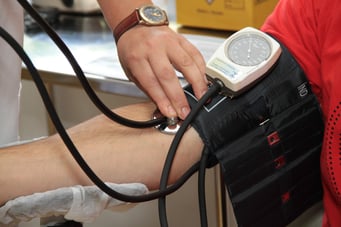February kicks off American Heart Month, an annual celebration that began in 1963 to encourage Americans to join the battle against heart disease. A presidential proclamation pays tribute each year to researchers, physicians, public health professionals, and volunteers for their tireless efforts in preventing, treating, and researching heart disease.
What is Heart Disease?
Heart disease, which is also referenced as cardiovascular disease, is the leading cause of death by killing about 610,000 people (or 1 in every 4) in the U.S. every year. According to Mayo Clinic, heart disease includes blood vessel diseases, heart rhythm problems (arrhythmias); and heart defects you're born with (congenital heart defects).
How knowledgable are you about heart disease? Take this quiz to find out.
What Are Some Risk Factors Associated With Heart Disease?
There are several risk factors when it comes to heart disease, including:
- Age. Aging increases your risk of damaged and narrowed arteries, and weakened or thickened heart muscle.
- Sex. Men are generally at greater risk of heart disease. However, women's risk increases after menopause.
- Family history. A family history of heart disease increases your risk of coronary artery disease, especially if a parent developed it at an early age.
- Smoking. Nicotine constricts your blood vessels and carbon monoxide can damage their inner lining, making them more susceptible to atherosclerosis. Heart attacks are more common in smokers than in nonsmokers.
- Poor diet. A diet that's high in fat, salt, sugar and cholesterol can contribute to the development of heart disease.

- High blood pressure. Uncontrolled high blood pressure can result in hardening and thickening of your arteries, narrowing the vessels through which blood flows.
- High cholesterol. High levels of cholesterol in your blood can increase the risk of formation of plaques and atherosclerosis.
- Diabetes. Over time, high blood glucose from diabetes can damage your blood vessels and the nerves that control your heart & blood vessels.
- Obesity. Excess weight typically worsens other risk factors.
- Physical inactivity. Lack of exercise also is associated with many forms of heart disease.
- Stress. Unrelieved stress may damage your arteries and worsen other risk factors for heart disease.
- Poor hygiene. Not regularly washing your hands and not establishing other habits that can help prevent viral or bacterial infections can put you at risk of heart infections.
What Are Some Symptoms of Heart Disease?
Symptoms of heart disease varies for men and women; however, they typically include:
- Pain, tightness, pressure, and/or discomfort in your chest
- Shortness of breath
- Pain, numbness, weakness or coldness in your legs or arms
- Pain in your neck, jaw, throat, upper abdomen, or back
- Palpitations (irregular heart beats, or a "flip-flop" feeling in your chest)
- A faster heartbeat
- Weakness or dizziness
- Sweating
- Nausea
If you're experiencing any of the above symptoms, it's best to call your doctor immediately instead of waiting for your next appointment.
How Can I Prevent Myself From Getting Heart Disease?
There are some heart diseases that you can't prevent such as heart defects. However, you can help prevent many other types by making some lifestyle changes such as:
- Quit smoking
- Controlling your high blood pressure, high cholesterol, and/or diabetes
- Exercising at least 30 minutes a day on most days of the week
- Eating a diet that's low in salt and saturated fat
- Maintaining a healthy weight
- Reducing & managing stress
Interested in pursuing a career in health care? Check out the Allied Health & Nursing programs Hocking College has to offer for anyone interested in working in the health care industry.
For more information on any of these programs, contact the Hocking College Admissions Office at (740) 753-7050.



